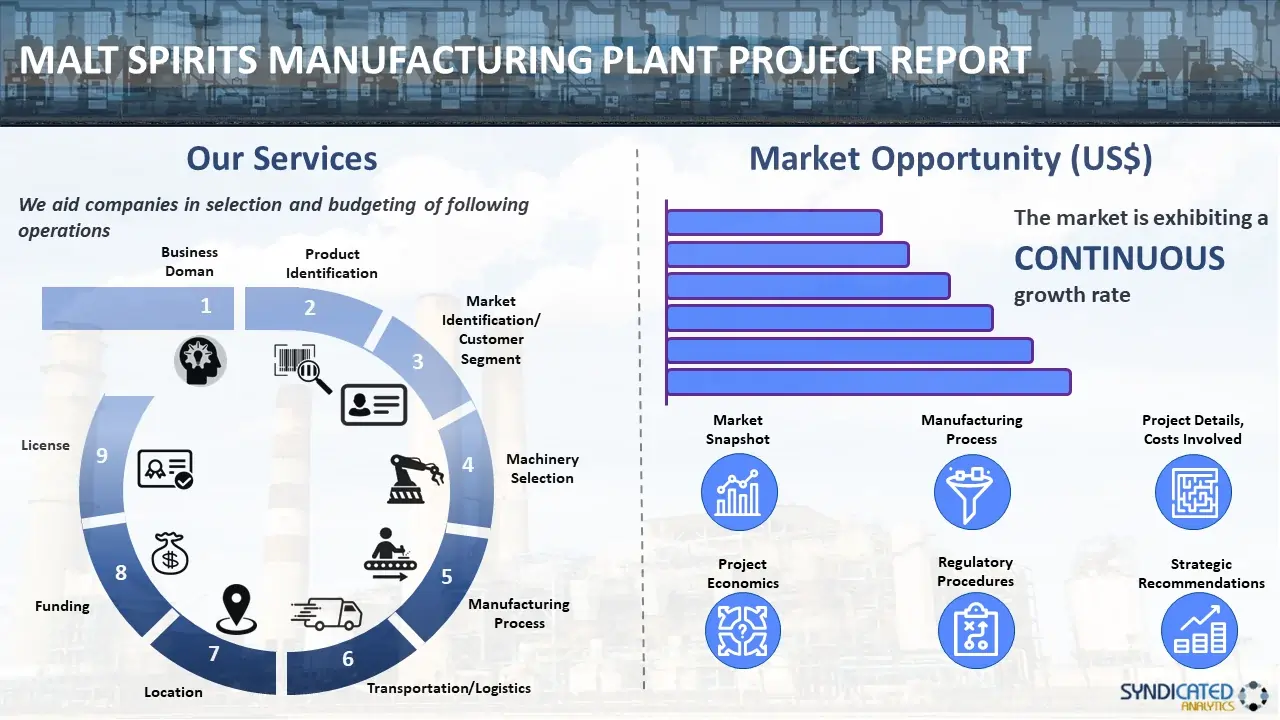
Malt Spirits Manufacturing Plant Project Report 2025 Edition
Report Coverage: Industry Analysis (Market Performance, Segments, Price Analysis, Outlook), Detailed Process Flow (Product Overview, Unit Operations, Raw Materials, Quality Assurance), Requirements and Cost (Machinery, Raw Materials, Packaging, Transportation, Utility, Human Resource), Project Economics (Capital Investments, Operating Costs, Profit Projections, Financial Analysis, Revenue), and Investment Opportunities
Report Overview:
The new report conducted by Syndicated Analytics, titled "Malt Spirits Manufacturing Plant Project Report 2025 Edition: Industry Analysis (Market Performance, Segments, Price Analysis, Outlook), Detailed Process Flow (Product Overview, Unit Operations, Raw Materials, Quality Assurance), Requirements and Cost (Machinery, Raw Materials, Packaging, Transportation, Utility, Human Resource), Project Economics (Capital Investments, Operating Costs, Profit Projections, Financial Analysis, Revenue), and Investment Opportunities," offers a comprehensive guide for establishing a manufacturing plant in the malt spirits industry. It encompasses a wide-ranging market overview and delves into specific details such as unit operations, raw material requirements, utility needs, infrastructure prerequisites, machinery and technology specifications, workforce demands, packaging prerequisites, transportation logistics, and more.
Furthermore, this report delivers extensive insights into project economics, including capital investments, project financing, operating costs, income and expenditure forecasts, fixed versus variable expenses, direct and indirect outlays, expected return on investment (ROI), net present value (NPV), profit and loss analysis, and comprehensive financial assessment.

Market Analysis
| Current Demand for Malt Spirits | The report evaluates the existing global demand for malt spirits. |
| Growth Prospects and Trends | The study delves into the growth prospects and emerging trends within the malt spirits market, providing insights to guide strategic decision-making. |
| Leading Segment and Regional Analysis | This study presents a concise overview of the key segments and regional influence in the malt spirits market, providing a comprehensive view of the industry's overall landscape. |
| Competitive Landscape | An analysis of the competitive landscape highlights key players in the malt spirits manufacturing industry, shedding light on their strategies and market positioning. |
A. Introduction
Malt spirits refer to alcoholic beverages distilled primarily from malted barley, a process that imbues them with distinctive flavors and characteristics. The malting process involves soaking the barley grains in water to germinate, and then drying them in a kiln, which develops their unique flavors and enzymes required for converting starches into fermentable sugars. These sugars are then fermented with yeast to produce alcohol, which is later distilled to create the spirit. The most renowned malt spirit is malt whisky, particularly single malt whisky, often associated with Scotland but also produced worldwide. Unlike blended whiskies, which combine various grain spirits, malt whiskies use only malted barley, offering a pure expression of the grain's flavor profile. These spirits are celebrated for their complexity, depth, and variety, exhibiting a range of tastes influenced by the specifics of their production, including the malting process, fermentation, distillation, and aging in oak barrels, which contribute to their unique aromas, flavors, and smoothness.
B. Market Trends/Drivers
The growing appreciation for premium spirits among consumers represents one of the key factors influencing the growth of the market across the globe. Malt spirits, known for their rich flavors, craftsmanship, and heritage, appeal to consumers seeking high-quality, artisanal beverages. This trend is bolstered by an increasing interest in the provenance of spirits, with enthusiasts keen to explore products with unique stories, ingredients, and production methods. The rise of craft and small-batch production is significantly driving the market. Artisan distilleries are experimenting with various barley types, distillation methods, and maturation processes, which is creating innovative and diverse flavor profiles. This innovation attracts consumers eager to explore new tastes and experiences, which is expanding the malt spirits market beyond traditional boundaries.
The market is also driven by globalization and the expansion of e-commerce. The increasing global exposure and the ease of online shopping are making it simpler for consumers to discover and purchase a wide array of malt spirits from different parts of the world, which is fueling the market growth. This accessibility is broadening the consumer base, which is reaching enthusiasts and connoisseurs alike, who are willing to invest in premium spirits. In addition to this, the rising shift in consumer behavior toward favoring quality over quantity, particularly among younger generations is contributing to the growth of the market. Marketing and branding strategies are also boosting the market growth. Many brands are engaging consumers through storytelling, emphasizing the heritage, tradition, and meticulous production processes behind their spirits. This marketing approach is helping cultivate a strong brand identity and loyalty among consumers, further propelling the market growth. Apart from this, the expansion of the hospitality and tourism industries, including the rise of whisky tourism, is contributing to the increased popularity of malt spirits which is creating a positive outlook for the market.
This report is essential reading for entrepreneurs, investors, researchers, consultants, and business strategists with interests in the malt spirits industry. It offers a thorough examination of the current state of the industry and its future potential, supplying valuable information for informed decision-making and strategic planning. Serving as an invaluable resource, this report provides a detailed exploration of the malt spirits industry, making it an indispensable tool for those looking to establish a strong presence in this dynamic sector.
Market Coverage:
| Current Demand for Malt Spirits | The report evaluates the existing global demand for malt spirits. |
| Growth Prospects and Trends | The study delves into the growth prospects and emerging trends within the malt spirits market, providing insights to guide strategic decision-making. |
| Leading Segment and Regional Analysis | This study presents a concise overview of the key segments and regional influence in the malt spirits market, providing a comprehensive view of the industry's overall landscape. |
| Competitive Landscape | An analysis of the competitive landscape highlights key players in the malt spirits manufacturing industry, shedding light on their strategies and market positioning. |
Project Feasibility
| Technical Feasibility | The study outlines the intricacies of malt spirits manufacturing, outlining the necessary equipment and technological requirements. A clear description of the manufacturing process is provided. |
| Financial Feasibility | The report presents an in-depth financial analysis, including the initial investment required, income and profit projections. These financial insights aim to assist potential investors in assessing the viability of the project. |
| Environmental and Regulatory Considerations | The report also discusses the environmental and regulatory aspects associated with malt spirits production, ensuring that the project aligns with sustainability and compliance standards. |
Project Implementation
| Location Selection | Choosing the optimal location for the manufacturing plant is crucial. This section explores location-based factors impacting the project's success. |
| Plant Design and Layout | Detailed plant design and layout plans are presented, emphasizing efficient production processes and workspace ergonomics. |
| Procurement of Raw Materials | An overview of the procurement process for raw materials necessary for malt spirits production is provided, ensuring a smooth supply chain. |
| Production Process | An explanation of the malt spirits production process is provided in the study, from raw material input to the final product, highlighting key stages and quality control measures. |
| Quality Control Measures | Stringent quality control measures are outlined to ensure the production of high-quality malt spirits. |
Risk Analysis
| Identification of Potential Risks | Potential risks associated with the project are identified, allowing for proactive risk management strategies. |
| Risk Mitigation Strategies | The report proposes risk mitigation strategies to minimize the impact of identified risks on the project's success. |
Seeking a Tailored Project Report?
While we have endeavored to create a comprehensive report, we acknowledge that each stakeholder may possess unique requirements. In light of this, we offer the option to customize the report to align with your specific needs. You can convey your business specifications to our consultants, and we will furnish you with a personalized scope tailored precisely to your requirements. Some of the common customizations that our clients often request include:
- Tailoring the report to suit the country/region where you intend to establish your plant.
- Adapting the manufacturing capacity of the plant to meet your specific needs.
- Customizing machinery suppliers and costs to align with your requirements.
- Incorporating any additional elements into the existing scope as per your specifications.
Report Scope:
| Features | Details |
|---|---|
| Currency | US$ (Information can also be provided in the local currency) |
| Pricing and Purchase Options | Single User License: US$ 3450 Five User License: US$ 4450 Corporate User License: US$ 5450 |
| Customization Scope | The report can also be customized based on the requirements of the customer. |
| Post-Sale Analyst Support | 12-14 Weeks |
| Delivery Format | PDF and Excel through email (We can also provide the editable version of the report in PPT/Word format on special request) |
Why Choose Syndicated Analytics:
- Our reports offer valuable insights to stakeholders, enabling them to make informed business decisions confidently.
- We maintain a robust network of consultants and domain experts spanning over 100 countries across North America, Europe, Asia Pacific, South America, Africa, and the Middle East.
- Our extensive database includes equipment, and raw material suppliers from major continents, ensuring comprehensive coverage.
- We diligently track and update critical factors such as land costs, raw material costs, construction costs, utility expenses, labor costs, and more, across more than 100 countries worldwide.
- Syndicated Analytics is the trusted partner of choice for leading corporations, governments, and institutions globally. Our clientele ranges from small startups to Fortune 500 companies.
- Our dedicated in-house team comprises experts in various fields, including engineers, statisticians, modeling specialists, chartered accountants, architects, and more. They play a pivotal role in developing, expanding, and optimizing sustainable manufacturing facilities worldwide.
Purchase Options
Ask For Customization
Personalize this research
Triangulate with your own data
Get data as per your format and definition
Gain a deeper dive on a specific application, geography, customer or competitor
Any level of personalization
Get in Touch
Call us on
US: +1-213-316-7435
Uk: +44-20-8040-3201
Drop us an email at
sales@syndicatedanalytics.com